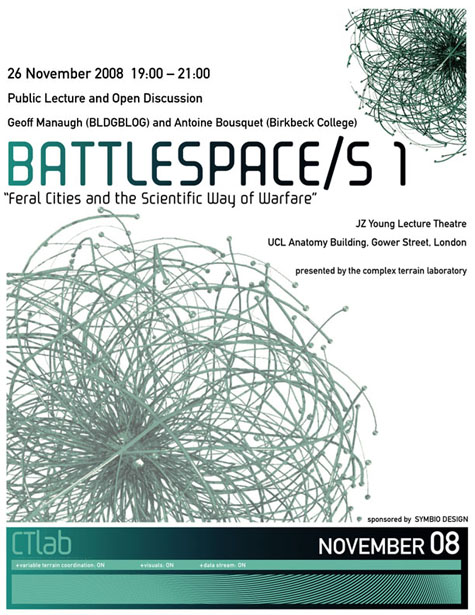 I'll be teaming up with Antoine Bousquet, Lecturer in International Relations at Birkbeck College, and author of the forthcoming book The Scientific Way of Warfare: Order and Chaos on the Battlefields of Modernity to discuss our work in relation to space, war, and the city.
I'll be teaming up with Antoine Bousquet, Lecturer in International Relations at Birkbeck College, and author of the forthcoming book The Scientific Way of Warfare: Order and Chaos on the Battlefields of Modernity to discuss our work in relation to space, war, and the city. A description of the event itself:
- Contemporary political discourse on armed violence and insecurity has been largely shaped by references to spatial knowledge, simulation, and control: "human terrain," "urban clutter," "terrorist sanctuaries," "failed states," "core-periphery." The historical counterpoint to this is to be found in the key role the successive technologies of clock, engine, computer, and network have all played in spatializing the practice of warfare. In this context, what implications do "feral" Third World cities, "rogue" cities organized along non-Western ideas of urban space and infrastructure, and "wild" cities reclaimed by nature, have for the battlespaces of today and tomorrow?
For my own part, I'll be discussing a pretty broad swath of ideas about "feral cities" – what I like to call cities gone wild – ranging from Richard J. Norton's seminal paper on the topic to Mike Davis's research on "the Pentagon as global slumlord," via reference to J.G. Ballard, Eyal Weizman, Stefano Boeri, Reza Negarestani, and many others.
I'll also briefly mention the radical ecology of a biologically wild city, or the city regressed (perhaps advanced?) into an extraordinary state of nature after abandonment and war.
 Some of the basic themes we should be approaching: If a growing majority of the human population has now been urbanized, moving into what are often incorrectly described as "cities," what will warfare mean – and how will it be practiced – in these increasingly complex spatial environments? If urban insurgency is, indeed, the future of the global battlefield, as many theorists have proposed, how does the changing nature of urbanism itself help to redefine war? Conversely, how does insurrection work to redefine the space of the modern city?
Some of the basic themes we should be approaching: If a growing majority of the human population has now been urbanized, moving into what are often incorrectly described as "cities," what will warfare mean – and how will it be practiced – in these increasingly complex spatial environments? If urban insurgency is, indeed, the future of the global battlefield, as many theorists have proposed, how does the changing nature of urbanism itself help to redefine war? Conversely, how does insurrection work to redefine the space of the modern city? Finally, if the future of war can be seen as Military Operation on Urban Terrain – or MOUT – what mutations will we see when that one key variable, the urban, is redefined?
So I'm really looking forward to this. I've got loads and loads of notes and references to bring with me, and it'll be good to meet Antoine, whose book I've been reading this month.
So if you're in London that night, stop by! It's free and open to the public. Wild cities, rogue cities, feral cities, future cities.
(Note: This event is sponsored by the excellent Symbio Design, who also produced our web banners, ads, and flyer).
No comments:
Post a Comment